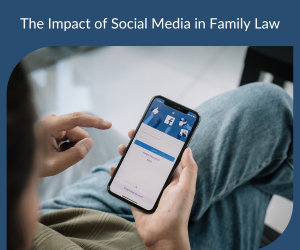
Social media has revolutionized the way we communicate and share our lives. From sharing vacation photos to connecting with friends, platforms like Facebook, Instagram, and Twitter have become integral parts of our daily routine.
However, when it comes to divorce, custody, and support proceedings, the impact of social media can be unexpected. In this article, we’ll delve into the role of social media in these types of family law cases and highlight why seemingly innocent posts can have far-reaching consequences in court. We’ll also provide essential advice on maintaining privacy and discretion during these proceedings.
The Power of Social Media in Divorce
Social media platforms have transformed how people interact, communicate, and present themselves to the world. Unfortunately, these platforms can also unwittingly serve as evidence in legal battles, including divorce, custody, and support cases. What might seem like harmless posts can be misinterpreted, used against a spouse, or taken out of context in court. That’s why it’s crucial to be mindful of one’s online presence during these proceedings.
Seemingly Innocent Posts, Significant Consequences
It’s easy to underestimate the potential impact of an innocent post on social media. A photo of a spouse enjoying a night out with friends, updates about new purchases, or even a random comment can be used by their spouse’s legal team to argue against one’s financial stability, parenting capabilities, ability to work, or even one’s emotional state. For instance, if one is fighting for child custody, a post that suggests recklessness or an unhealthy lifestyle might be used to question their suitability as a parent.
RELATED: Learn about the essential steps to file for divorce.
Digital Footprints: Admissible Evidence
Remember, once someone posts something online, it can never be fully erased. Even if they delete a post, screenshots and digital footprints can persist. Courts often consider social media activity as admissible evidence, and even if one’s privacy settings are stringent, there’s no guarantee that their posts won’t find their way into the courtroom. Think twice before hitting that “Post” button, as those words and images could end up being used in court.
Protecting One’s Privacy and Discretion
During divorce, custody, and support proceedings, exercising caution on social media is key. Here are some practical tips to safeguard one’s privacy and avoid potential pitfalls:
- Go Silent: Consider taking a break from social media altogether until the case is finalized. This eliminates any chance of inadvertently sharing information that could harm one’s case.
- Adjust Privacy Settings: If one chooses to remain active on social media, they should consider reviewing and tightening their privacy settings. Limit posts to only close friends and family, and avoid accepting friend or follower requests from unknown individuals.
- Think Twice: Before posting anything, one should ask themselves if it could be misconstrued or used against them. If there’s any doubt, it’s best to refrain from sharing.
- No Mention of Legal Proceedings: Avoid discussing the divorce or legal matters online. These discussions should remain confidential.
- Photos and Location Tags: Refrain from posting pictures that could be used to undermine one’s claims or paint an unfavorable image. Be cautious of geotags that disclose one’s location.
- Stay Respectful: Avoid negative comments about the other spouse or court proceedings. Such comments can reflect poorly on one’s character and impact negotiations.
In the age of social media, family law proceedings come with an added layer of complexity. What you share online can significantly influence the outcome of your case. Posts can have unintended and far-reaching consequences in court, affecting matters such as asset division, child custody, and support. By being mindful of your online presence, adjusting your privacy settings, and refraining from sharing sensitive information, you can protect your interests and present a more favorable image in court.
Are you approaching a divorce or other family law matter and need someone to help guide you through the steps to protect yourself and your family’s future? If so, our attorneys who are well-versed in all family law matters can help. Contact us now to set up a consultation however it is most convenient for you—via telephone, video, or in person.
FAMILY LAW SERVICES
Divorce
Legal Separation
Prenuptial & Postnuptial Agreements
Tax Issues
Fees
Adoption
Same-Gender Marriage
Domestic Partnerships
Child Custody
Family Support
Mediation in Divorce Matters
Collaborative Law Services










